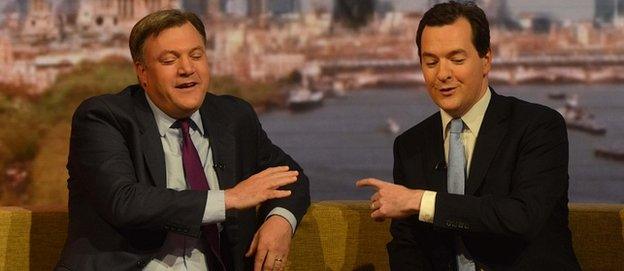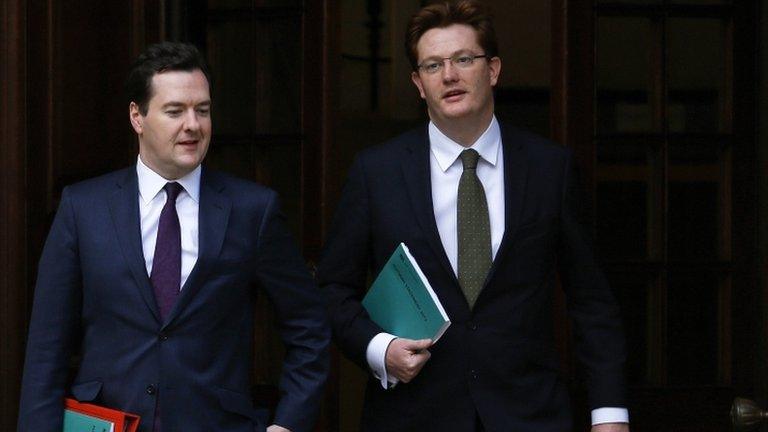Political gains to be made from Spending Review cuts?
- Published

The general election may still be just under two years away but this week is being seen by some as the moment when the campaign begins.
The cuts the chancellor unveils in his Spending Review will set out many of the choices that the Conservatives and Liberal Democrats will present to voters when they go to the polls in May 2015.
In turn, Labour's response will give the electorate a clear sense of what it will offer as it tries to return to power.
So despite the many thousands of words that will appear in election manifestos in the months ahead, the hard numbers of this week's Spending Review will tell a more compelling story. For this is about what will happen rather than what is promised. As such, this Spending Review is as much a political event as it is economic.
1) It is quite a modest affair. Note the language. It is not a Comprehensive Spending Review that sets out plans for several years. This Spending Review refers simply to the financial year 2015/16.
The £11.5bn cuts that it will spell out may sound a lot to you and me. But to the Treasury it is a relatively small amount compared with the government's overall budgets and the potential pain to come.
And it is politics that explains why this spending review is so minimalistic. It is all the Conservatives and Liberal Democrats felt able to agree on. This one year of cuts will be enough, they hope, to show - and convince - voters that they are still serious about cutting the deficit.
But equally, by limiting themselves to one year, they hope to give each other enough space and flexibility to set out their own competing policy priorities in the election campaign and the years ahead. For example, the Tories might promise more welfare cuts while the Lib Dems look for more taxes on the wealthy.
2) The timing of the Spending Review is extremely political. George Osborne did not have to hold it this year. He could have waited until next year. But he has chosen to go early so he can spend more than a year saying to Labour: "This is what the coalition will cut. What would you do?"
Not surprisingly, Labour has anticipated this and tried to answer at least some of the question. The party has said it would cut winter fuel allowance for richer pensioners, accept the coalition's child benefit cuts, and - as of this weekend - not borrow any more cash to reverse any day-to-day spending cuts.
The other Labour response is to try to change the question so it is not locked into an arms race that sees all sides saying "my cut is better and deeper than yours". Don't expect this to stop Mr Osborne asking the question.
3) The political priorities have not changed. This review takes place with much spending protected by so-called ring-fences. Budgets for health and schools in England and international development are not going to be touched.
This means that other departments - such as the Home Office, the business department, defence and local government - will face deeper cuts than they otherwise would have done.
Welfare may face cuts in 2015 - as work-related benefits rise by less than inflation - but it too will be protected from a further squeeze. What is interesting is that this ring-fencing is now finally beginning to be challenged, as some politicians realise that these choices are having a distorting and damaging effect on other spending.
A consensus of sorts is beginning to emerge between the parties that some welfare benefits for better-off pensioners might have to be cut after the election.
And in the wake of the controversies around Stafford hospital and the Care Quality Commission, politicians are beginning to ask how much NHS spending should remain protected in the future.
But for now, those ring-fences remain. In fact, what is remarkable about this Spending Review is that no minister has challenged its premise, namely that some spending should be ring-fenced, welfare should not be cut further and taxes should not be increased.
4) The politicians are happy to argue about this spending review so they can avoid talking about the next one. Whoever is in government after the next election faces some dreadful choices. There will be more cuts, not fewer.
The Institute for Government is already predicting an austerity election in 2020. The Institute for Fiscal Studies says a future chancellor will have to find another £23bn of cuts if the structural deficit is to be abolished by 2018.
The Resolution Foundation goes one further and predicts £26bn. One of the reasons the current Spending Review has been less tense than usual is that Whitehall is saving some of its arguments for next time, when the street will be awash with bleeding stumps.
- Published26 June 2013
